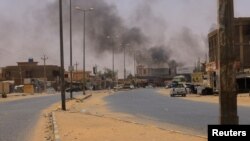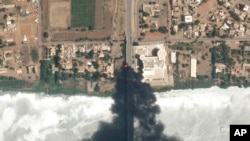The International Committee of the Red Cross warned Sunday that fighting in densely populated areas in Sudan is putting the lives of civilians at risk.
The ICRC’s call is one of many humanitarian organizations urging all parties to the conflict to take immediate action to protect civilians.
Germain Mwehu, ICRC spokesperson in Khartoum, told VOA there are grave concerns over the use of explosives in populated areas.
“There are blasts, there is heavy gunfire anytime,” Mwehu told VOA’s English to Africa Services’ South Sudan in Focus radio program. He added that is the case not only in the capital city but other cities in the country.
The situation in Sudan remains tense, with ongoing clashes between government forces and the country’s paramilitary group, Rapid Support Forces, in several parts of the country.
“It’s a very horrifying situation for the civilian population. They can’t move. It’s very dangerous for everyone to move, including humanitarian organizations,” Mwehu said.
Alfonso Verdu Perez, the head of the ICRC delegation in Sudan, said in a statement the ongoing conflict in Sudan has escalated, particularly in urban areas, leading to a high number of civilian casualties.
As of Sunday, the number of civilians killed has reached 59 with nearly 700 others injured, but humanitarian organizations say the death toll could rise.
The conflict is impacting the ability of humanitarian organizations to aid those in need, Mwehu said.
“There are students, for example, who have been stuck in schools since yesterday morning. There are people who were traveling at the airport. They have been stuck there since yesterday morning. There are those who work in the market and other places. They are not able to go back to their home. Those who are in hospitals, they can’t receive visits from the families, medical workers, they can’t reach the place the[y] work, and humanitarian organizations, they're not in a position, they can’t move in the cities to provide humanitarian assistance.”
The ICRC has reiterated its commitment to providing assistance to civilians affected by the conflict, but emphasized that without an end to the fighting, the situation will continue to deteriorate.
“The civilian population is exposed. They are not spared,” Mwehu told VOA.
Mwehu said the fighting also impacts refugees and internally displaced people in the country. “We have in Sudan, refugees from Chad, refugees from CAR [the Central African Republic], refugees from South Sudan, refugees from Ethiopia, refugees from Eritrea, the situation will also affect everyone, so the situation is already very difficult from [a] humanitarian perspective, I’m afraid, due to this fighting happening now in different parts of the country and it will make it even more difficult.”
According to the U.N., Sudan is home to more than 1 million refugees from neighboring countries.
This story originated in VOA English to Africa Service’s South Sudan in Focus radio program.








